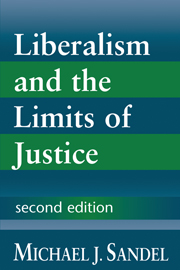Book contents
- Frontmatter
- Contents
- Preface to the Second Edition: The Limits of Communitarianism
- Acknowledgments
- Introduction: Liberalism and the Primacy of Justice
- 1 Justice and the Moral Subject
- 2 Possession, Desert, and Distributive Justice
- 3 Contract Theory and Justification
- 4 Justice and the Good
- Conclusion: Liberalism and the Limits of Justice
- A Response to Rawls' Political Liberalism
- Bibliography
- Index
2 - Possession, Desert, and Distributive Justice
Published online by Cambridge University Press: 05 June 2012
- Frontmatter
- Contents
- Preface to the Second Edition: The Limits of Communitarianism
- Acknowledgments
- Introduction: Liberalism and the Primacy of Justice
- 1 Justice and the Moral Subject
- 2 Possession, Desert, and Distributive Justice
- 3 Contract Theory and Justification
- 4 Justice and the Good
- Conclusion: Liberalism and the Limits of Justice
- A Response to Rawls' Political Liberalism
- Bibliography
- Index
Summary
Having clarified the status of Rawls' motivational assumptions, we can now put his theory of the person and his theory of justice side by side to check for the fit between them. In this way we can work within the argument from reflective equilibrium, by asking whether the theory of the person contained in the original position corresponds to the principles of justice it must both shape and reflect. Of special interest for this purpose is the difference principle, the principle that permits only those inequalities that work to the benefit of the least advantaged members of society. We shall see in this chapter that an adequate defense of the difference principle must presuppose a conception of the person unavailable on deontological assumptions, that we cannot be subjects for whom justice is primary and also be subjects for whom the difference principle is a principle of justice. A central focus will be on the role of desert in distributive justice, and on the conception of possession it requires. To explore these issues, we begin by contrasting Rawls' views with various competing distributive theories, and in particular the rival, but in some ways strikingly similar theory defended by Robert Nozick (1974).
LIBERTARIANISM TO EGALITARIANISM
From a practical political point of view, the positions of Rawls and Nozick are clearly opposed. Rawls, the welfare-state liberal, and Nozick, the libertarian conservative, define between them the clearest alternatives the American political agenda has to offer, at least where issues of distributive justice are concerned.
- Type
- Chapter
- Information
- Liberalism and the Limits of Justice , pp. 66 - 103Publisher: Cambridge University PressPrint publication year: 1998
- 1
- Cited by

